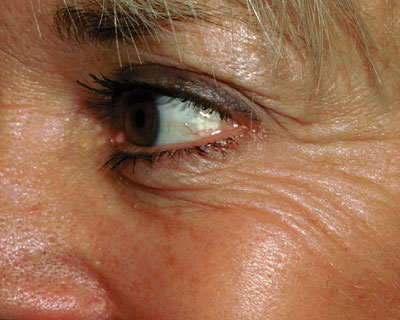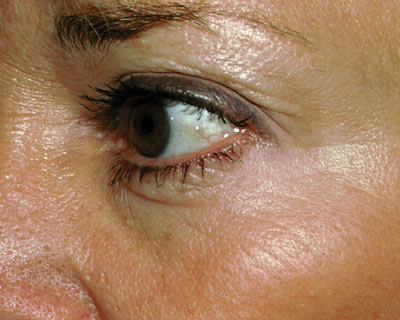Botulinum toxin is produced by a specific type of bacteria. In higher amounts, it can be poisonous. However, only small, weaker doses of botulinum toxin are used to reduce facial wrinkles.
When botulinum toxin is injected, it blocks certain nerve signals that make muscles contract. The muscles relax, reducing unwanted wrinkles. This effect lasts about 3–6 months. After that, the muscles move again and wrinkles come back.

Crows’ feet before botulinum toxin injection
When you have botulinum toxin injected, your doctor may first rub an anesthetic cream on the area to numb it. Then he or she will inject the medicine into specific facial muscles. This only takes a few minutes, and can be done right in the doctor’s office. Ask your doctor what activities should be avoided immediately after your treatment.
Within the first week of your treatment, you should notice your muscles begin to relax and fewer facial lines and wrinkles. This effect wears off in about 3–6 months.

Crows’ feet after botulinum toxin injection
Botulinum toxin injections usually work for wrinkle reduction.
For most people, these injections help wrinkles go away. But for some people, wrinkles may look just the same. Talk with your doctor about what to expect from botulinum toxin injections. He or she can tell you about other wrinkle-reduction options if injections do not work for you.
Who can get botulinum toxin injections?
You need to be healthy and at least 18 years old before you can get botulinum toxin injections.
Some people should not get botulinum toxin. They include those who:
- have a neuromuscular disease (such as multiple sclerosis or myasthenia gravis)
- are pregnant or nursing
- have weakness in certain facial muscles
- have ptosis (drooping eyelids), deep facial scars, or uneven facial features (when features are not the same on both sides of the face)
- have skin problems near the injection area
If you are planning to get botulinum toxin injections, tell your doctor about your medical history and all the prescription medicines, vitamins, and herbal supplements you take.
While botulinum toxin injections may help, they sometimes cause side effects or other health problems. Common side effects include:
- headache
- eye redness, tearing, or irritation
- redness or bruising in the injection area. This is more likely to happen if you take aspirin or blood-thinning medicine. Ask your doctor if you should stop taking those medicines a few days before getting a botulinum toxin injection.
Drinking alcohol 24 hours before treatment also increases redness and bruising.
A less common but more serious side effect is ptosis (drooping eyelids). This can make it hard to see. Ptosis should go away when the botulinum toxin wears off in a couple of months. Speak with your ophthalmologist about other options.
To help reduce the possibility of side effects, your doctor may recommend using eye drops or ointment after a botulinum toxin injection. You may also be asked to sit upright (not lie down) and avoid pressing on the treated area for about 4 hours after the injection. Also, your doctor may recommend you not exercise for 24 hours after treatment.
Thinking about getting botulinum toxin injections for wrinkles?
Talk with your ophthalmologist. He or she is an eye medical doctor and surgeon. They are the most familiar with your eyes, including the muscles and structures surrounding them.